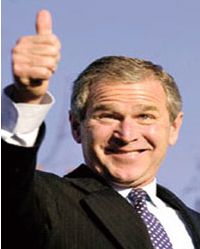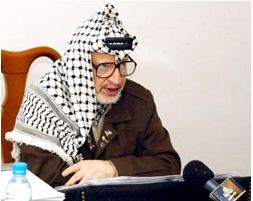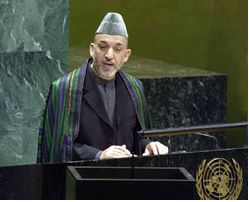Happy New Year?
If the quality of life can best be measured by the quantity of hope it generates, there is no shortage of reasons for doubting that 2005 will find humanity at large substantially better placed than during the year just past. And 2004 was in many ways a less hopeful period of time than the preceding year. Although 2003 will chiefly be remembered for the assault against Iraq, it also accounted for the largest anti-war demonstrations ever witnessed anywhere in the world.
The peace movement hasn’t withered away or fallen into a stupor, but the stupefying conflict in Iraq has taken its toll by promoting a mixture of helplessness and hopelessness. Anti-war activists will, no doubt, be among those who plan to make their presence felt at George W. Bush’s second presidential inauguration on January 20.
The strategy is marvellously simple: making themselves as inconspicuous as possible, anti-Bushies will infiltrate the crowd that gathers for the swearing-in ceremony. Then, at a given moment, they will all turn their backs on the president. The plot has been publicised because it is difficult for the authorities to pre-empt it, short of barring commoners from the ceremony. Whether it has any impact as a gesture of contempt towards an obnoxious administration depends almost entirely on the numerical strength of the protesters. A sudden about-turn by a dozen or so audience members would barely be noticeable. A couple of hundred backs turning in unison would be hard to ignore.
If effective, the symbolism would serve as a reminder of the divisiveness of last year’s election campaign — the worst aspect of which was, of course, the hopeless outcome. Less than two months after polling day, a national opinion poll for the first time found a majority opposed to the war against Iraq. That’s an idea that Bush’s democratic rival, John Kerry, was never able to articulate convincingly. For all his shortcomings and equivocations, Kerry would have made a less dangerous president than the incumbent, not least because he wouldn’t have been surrounded by a coterie of single-minded ideologues.
Beyond Iraq and a hazardous tendency towards unilateralism in the conduct of international affairs, there were any number of valid domestic reasons for limiting Bush to a single term. The American electorate decided otherwise, and chances are that over the next four years it will have ample cause to regret its decision. Even before the inauguration, there have been indications of disenchantment with the administration among its supporters, with flak directed primarily at defence secretary Donald Rumsfeld, the most senior member of the cabinet to have retained his position for the second term.
December hasn’t been good to Rummy. First there was his brusqueness in responding to marines’ concerns about inadequate equipment in the war zone. Then it emerged that the condolence letters sent by the Pentagon to the families of soldiers killed in Iraq are signed not by the secretary but by a machine. Hot on the heels of that scandal came the deadliest single attack on American troops when a bomb wrecked the mess at a US army barracks in Mosul during lunchtime. By then, senior Republicans had already begun to publicly question Rumsfeld’s suitability for the defence slot, and the secretary responded in the usual manner: he escaped to Baghdad on Christmas Eve.
Had he not enjoyed the protection of Dick Cheney, Rumsfeld may well have lost his job in the wake of revelations early in 2004 about the ongoing torture and abuse of prisoners at Abu Ghraib. The unconvincing attempt to pass that off as an aberration has since floundered in the face of growing evidence that not only was cruelty condoned at detention facilities in occupied Iraq and Afghanistan as well as at Guantanamo Bay, but that tactics which clearly contravene the Geneva Conventions were approved at the highest level.
That means this particular demonstration of American respect for human rights enjoyed White House sanction. And it happens to be another aspect of the so-called war on terror that Kerry couldn’t bring himself to mention, let alone fulminate against.
It remains to be seen how long Rumsfeld — who has been in the employ of Republican administrations since the Nixon-Ford era — can cling on to his job. Should the disaster in Iraq degenerate into an even bigger cataclysm in the wake of the elections scheduled for the end of this month, Cheney might feel obliged to withdraw his protection.
On the other hand, he might not. After all, the vice-president represents the darker aspect of an administration that has no bright side beyond the occasional entertainment provided by a president whose brain and mouth don’t always operate in harmony.
If the past month is any indication, January 30 will bring little relief for Iraqis, amid signs of a widening Sunni-Shia divide and the likelihood that the occupiers will be devoting themselves to encouraging — and, if necessary, producing — positive results. Such a task may prove harder in Iraq than it did in Afghanistan, where the US-installed Hamid Karzai sought to progress beyond puppetry last year by arming himself with a popular mandate. Iraqi PM Iyad Allawi’s thuggish looks are complemented by a reputation to match and long-standing CIA connections. He isn’t all that different, in other words, from Saddam Hussein (who may go on trial at some point this year).
With Iraq in a worse situation, both economically and in terms of security, than at any time during Saddam’s tumultuous tenure, Allawi isn’t exactly the most popular man in the country. Most Shia parties, meanwhile, have formed a united front, while among Sunnis the talk is of an electoral boycott. Fair and free elections are all but impossible to imagine in the conditions created by the occupation (foreign monitors, for instance, will be stationed in Jordan because of security concerns), but even a semi-adequate exercise would probably yield a majority for Ayatollah Sistani’s coalition — which Iran would welcome but the US would probably find intolerable.
On the other hand, how much credibility could there possibly be in a commanding majority for collaborators? With his customary mixture of hubris and hypocrisy, Bush recently had the gall to warn Damascus and Tehran against interference in Iraq’s internal affairs. Iran, for much of the preceding year, has been under considerable pressure on account of its nuclear ambitions, despite its engagement with international agencies and European diplomats. The Pentagon has reportedly drawn up plans for air strikes, although the possibility remains that the task will be delegated to Israel.
Notwithstanding the nature of the regime in Tehran, any attack on Iran would be a monumental stupidity. That, unfortunately, offers no guarantee against it, even as the cauldron of the oldest conflict in the Middle East continues to bubble. The US and Israel continue to insist that the demise of Yasser Arafat and the likely anointment of Mahmoud Abbas as his successor has opened up a window of opportunity for a permanent settlement. Yet Israel, while continuing to demand a cessation of Palestinian violence without holding out the prospect of reciprocity, is yet to offer any indication of its willingness to withdraw to the 1967 borders. And for Abbas to accept anything less would be political suicide.
Viable Palestinian statehood continues to require a miracle, and Tony Blair’s quick trip to the region last month, followed by the announcement of a conference in London in March, appears to be geared towards squeezing further concessions out of the Palestinians — the reverse of what is actually required. The diplomatic spurt was also occasioned by the British prime minister’s need to portray himself as something more than a Bush appendage, given that he will be seeking a third term in office this year, and the electorate has been less than enchanted by his performance on the world stage. However, barring a leadership challenge within the Labour Party, Blair is bound to achieve his goal, given that neither the Tories nor the Liberal Democrats are thus far in any position to make a serious bid for power.
Elsewhere in Europe, Germany and France remain at odds with the US, although Gerhard Schroeder tends to be more conciliatory than Jacques Chirac. But even an expanded European Union remains a poor match for the US. Italy’s Silvio Berlusconi remains Washington’s best friend in continental western Europe, and his political fortunes are fascinating to observe.
Further east, the drama of the year was witnessed in Ukraine, with both Russia and the US taking a keen interest — and opposite sides — in the contest between Viktor Yanukovich and Viktor Yushchenko. The latter’s apparent poisoning and the consequent dramatic change in his appearance added a bizarre twist to the tale, and it will be interesting to see how the former Soviet republic fares under a new, westward-gazing regime.
Vladimir Putin — himself re-anointed last year in an election that made minimal concessions to democracy, humiliated himself in the Ukrainian context. Although Russian concern over the proliferation of US bases on its periphery isn’t surprising, Moscow’s own role in what it describes as its “near abroad” is hardly beyond reproach.
And then there’s Chechnya. The atrocious events in Beslan last September and other instances of terrorism gave Putin an excuse to tighten his grip, eliciting squeals of surprise from the West. What he doesn’t have is any plan to tackle the Chechen issue politically. Nor does he have anything to offer economically-stricken Russians beyond further privatisation.
So, a hundred years after the revolution that began the process of eroding the feudal tyranny of the tsars, Russians remain subjugated by forces beyond their control. But in a world where well-being is measured by whether others are worse off than you, Russians are in the middle of the scale, with sub-Saharan Africa easily qualifying as the most wretched part of the earth, with long-term drought and a devastating Aids epidemic complemented last year by conditions that verged on genocide in Sudan’s Darfur region, which eclipsed the ongoing strife in Congo and the Ivory Coast. As in so many other parts of the globe, the causes of bloodshed in Darfur boiled down to a contest for limited resources. Sudan came under international pressure to halt the officially sanctioned massacres, but the area is likely to remain volatile during the year ahead.
The United Nations itself, meanwhile, is at some risk from what secretary-general Kofi Annan has described as an American lynch mob, with the organisation’s traditional foes orchestrating a loud campaign based on as yet unproven allegations of corruption. It will also be interesting to see whether far from radical proposals for UN reform — including Security Council expansion, albeit without veto rights for new permanent members — go anywhere.
Among other places to watch: Venezuela, where the populist leader Hugo Chavez continues to defy US pressure and middle-class opposition with support from the nation’s poor, who last year defeated yet another attempt to unseat the former colonel; and Chile, where towards the end of 2004, prospects brightened of a trial for brutal military dictator Augusto Pinochet. Saudi Arabia, too, will continue to attract attention, with the conservative monarchy locked in a widening struggle with confessional militants — a violent contest that may, in the end, prove unwinnable for the House of Saud. If the regime’s grip gets tenuous, how will the US react? More blood for oil?
In faraway Havana, meanwhile, when the US interests section refused to respond to official requests to take down a Christmas display that prominently featured the figure 75 — a reference to the number of political prisoners in the country — the Cubans responded by plastering the diplomatic mission’s outer walls with giant photographs depicting abuse of the Abu Ghraib variety, with swastikas thrown in for good measure. Not many countries would dare to excoriate uncle Sam so unequivocally.
Perhaps all is not lost. Yet in most parts of the world, 2005 begins on a solemn note, even a despairing one. Hope? That’s just a four-letter word.
Mahir Ali is an Australia-based journalist. He writes regularly for several Pakistani publications, including Newsline.





